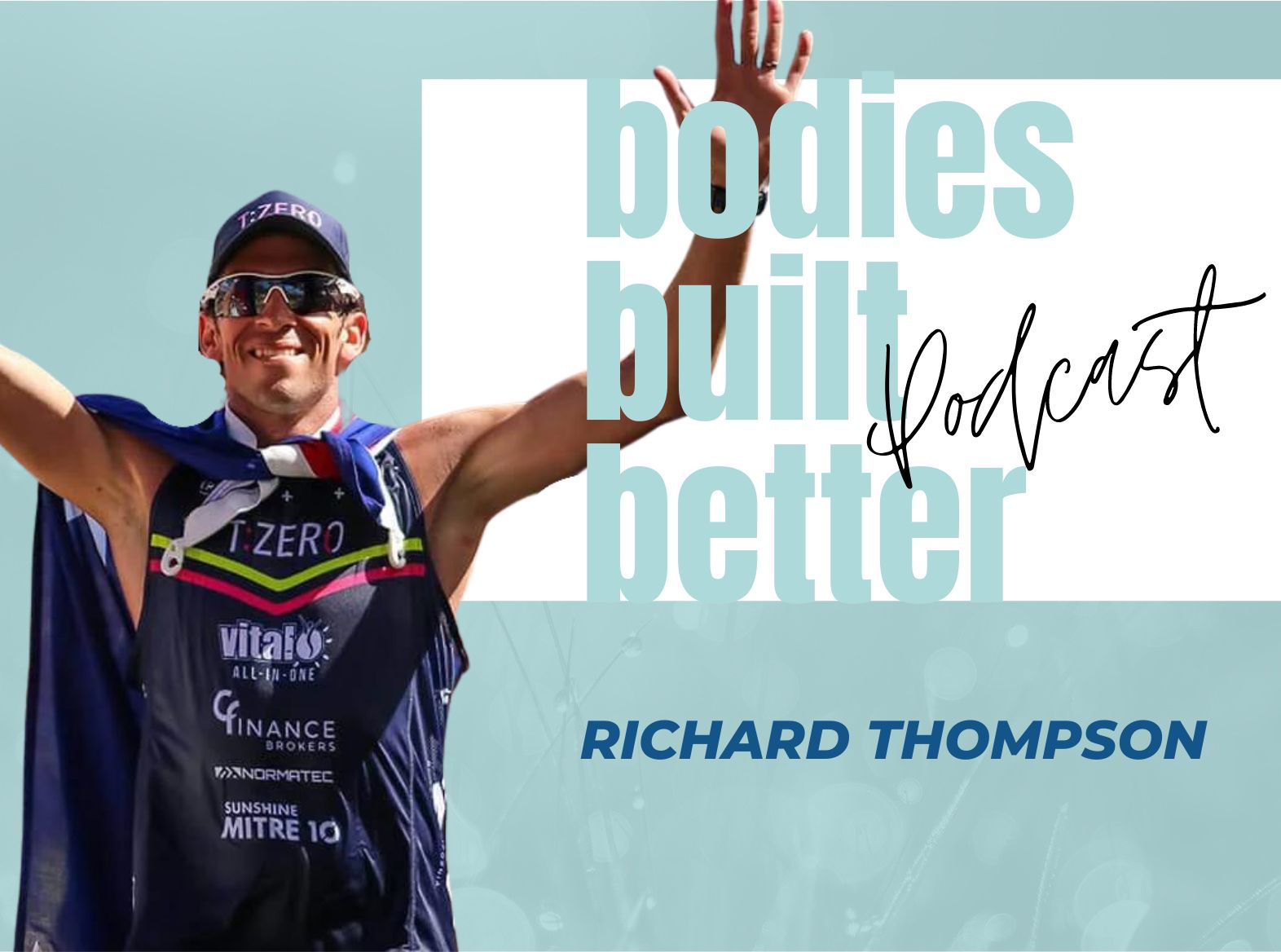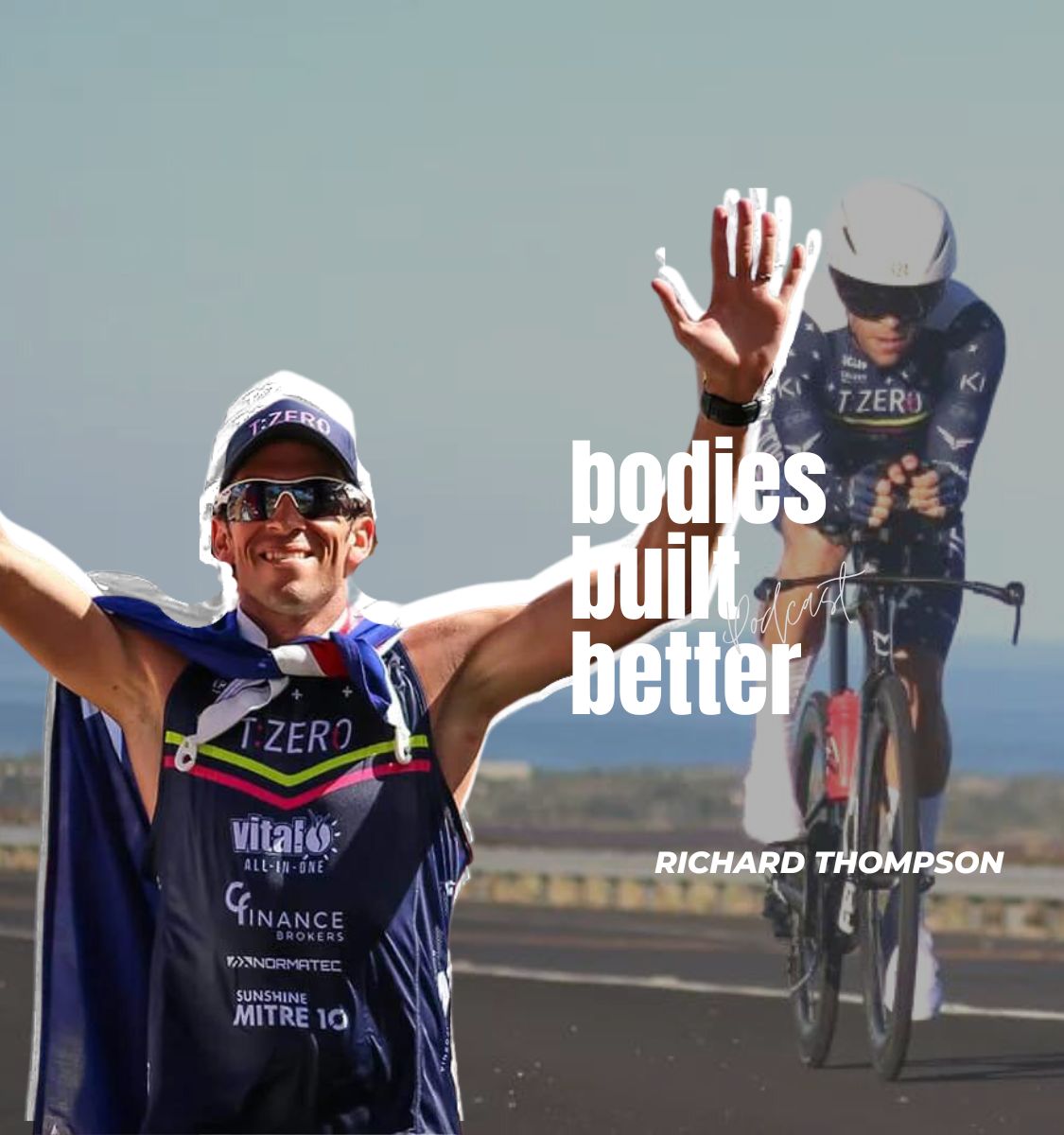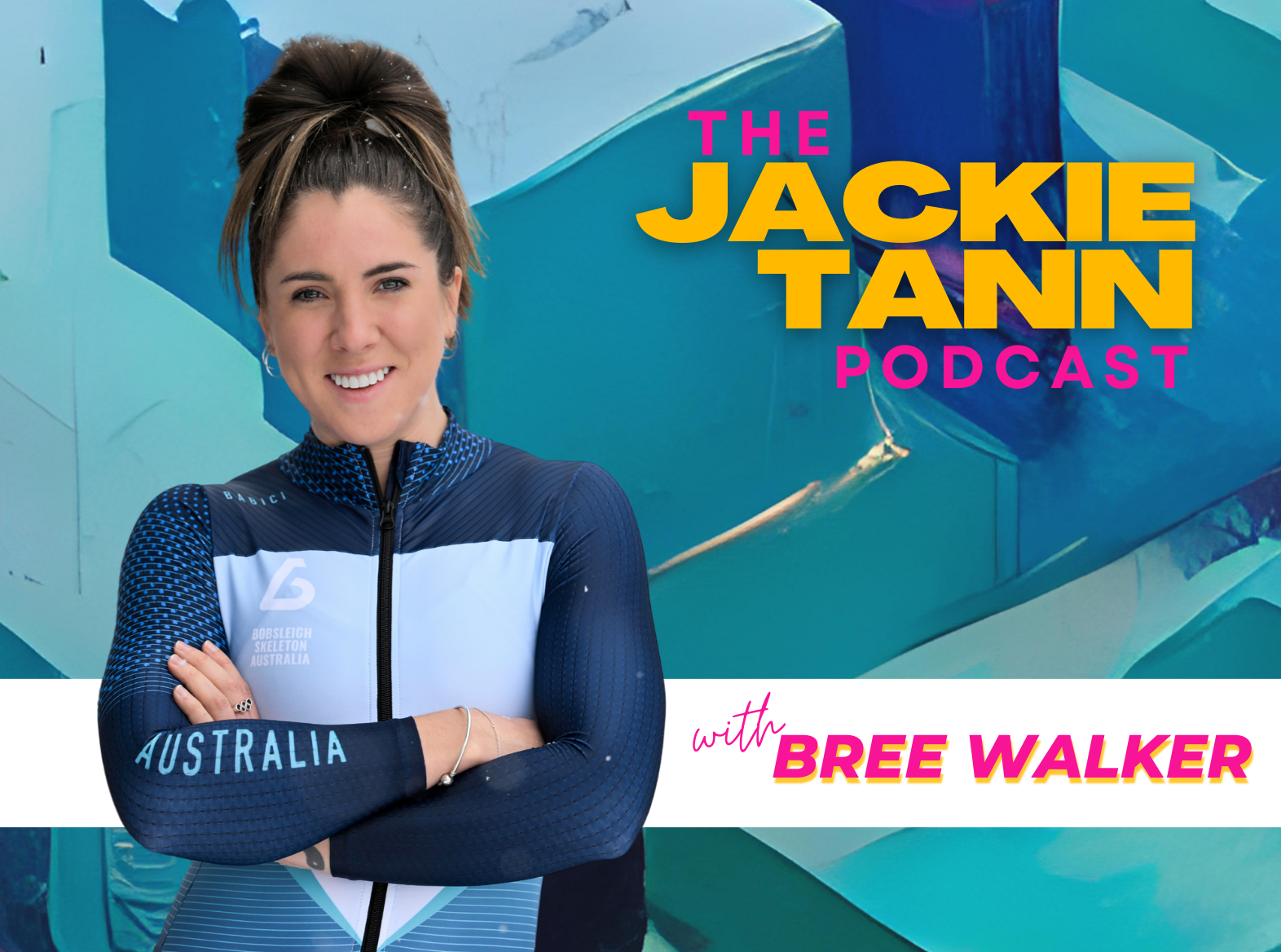Jackie 0:00
Hey, hey, this is Jackie Tann, and welcome to the bodies built better podcast, the show all about human performance. I have the honour of chatting with athletes, coaches, scientists, health experts and ordinary people doing extraordinary things. We cover topics on anything that encompasses human performance, how to get stronger, fitter, faster, as well as how to recover how to master your mindset, build self esteem, self awareness and confidence, how to overcome challenges and setbacks. And we educate you on how to master your incredible machine, your body, we explore the body’s incredible ability to heal, adapt and evolve so you can crush limitations. Reconnect your body and mind and discover your extraordinary potential. So how incredibly fitting that we launched Season Three with someone who is constantly pushing the boundaries of what the human body and mind can achieve. He is the Ultraman world champion and a world record holder, Richard Thompson. And for those of you who don’t know what an Ultraman is, let me break it down for you. Ultra man is a three day 515 kilometre annual endurance race divided into four stages over three days. Day one, a 10 kilometre swim followed by 100-140 kilometre bike ride, day two to a 281 kilometre bike ride, and a three is a 43 kilometre run. What I love about this episode is that whilst you may think the conversation will be all about deconstructing a world record Ultraman preparation, it’s so much more than that. Richard talks about reaching the limits of your self imposed potential, and what it really means to push the physical and mental boundaries. In discovering your untapped potential. We talk about the Kanguru Sub20. Our challenge is his extraordinary goal of completing a Sub20 Ultraman. This is really exciting because this is being filmed and the documentary will be released next year where you will see everything that goes into preparing for such a huge event, and what it takes to truly discover your potential. We also talk about T-Zero which is his coaching business, and how he and his team are helping athletes achieve their goals and mental shifts needed to overcome setbacks and mental barriers. He’s described as one of the greatest endurance athletes of all time. This is one of my favourite conversations. Enjoy this episode with Ultraman World Champion, Richard Thompson.
How Richard Started As An Athlete
Jackie 3:14
Richard, thank you so much for chatting with me today. Welcome to the Bodies Built Better podcast.
Richard 3:21
Thank you so much. And thank you so much for having me. It’s um, yeah, it’s a real pleasure.
Jackie 3:26
Oh, the pleasure is mine. But I’ve got to admit, it was only a couple of months ago that I even found out what Ultraman was. And it’s through a couple of clients of mine, and I’m helping them with their recovery. And they’re being coached by you and who better to be coached by then be world champion and record holder. I think the thing that I love about your story is that you started triathlons and correct me if I’m wrong, but you started after school, which you were rubbish at. Those are your words, you came last in your first event. And then fast forward 2017 you’re, you know, become world record holder on your debut. And then 2019 world champion. And not only like it’s just such an incredible achievement. And not only have you achieved incredible things, but you’re helping others achieve great things as well through your coaching. And so I thought to start this off, if you could give us some background as to how you got into triathlons. Why, and then eventually getting into the Ultraman.
How He Learned To Enjoy Triathlons
Richard 4:42
Yeah, I think my background is probably a little bit different to most kids or adolescents going into the sport. I did team sports throughout school. I was marginally overweight and enjoyed, that I didn’t really enjoy running at all. And then add into uni, I thought I need to get a bit fitter and found triathlon, as you said, yeah, a lot first race I did, I was dead last in my, in my age group and full of confidence that I genuinely thought I was going to win that race, which is hilarious. But the confidence isn’t never lost on me. But I really enjoyed it, I enjoyed that it was different, I enjoyed that it was an individual sport in the sense that I’d done teamwork, team sports, throughout my entire life up to that point. And so I really enjoyed the idea that the more you put in yourself, the the potential, you know, hopefully the rewards would prevail as a result, you’re not reliant on you know, anyone else in the team pulling their weight. So that was really enjoyable.
Finding His Strengths Through Training
Richard 5:50
That aspect and I didn’t really have any big goals that I’d think in terms of, you know, I see a lot of athletes obviously come through the coaching side of things, and they’ve got some amazing goals and aspirations. And probably because I was so, so new in the sport, I was just sort of cutting my teeth, but I didn’t have any expectations about where I wanted to go with it. I just know that I knew that I really enjoyed the training. And I really enjoyed, I guess, just improving, like, it’s so enjoyable seeing that you can, there’s, there’s because you’re against the clock for most of it. And then sometimes there’s course conditions and weather conditions that change that. But, you know, primarily, there’s so much data and training, you know, whether or not you’re improving, and so, I really enjoyed that.
Getting Started on Ironman
Richard 6:38
And then yeah, it was from 17, at last at a sprint triathlon in Brisbane to then, I went to Ironman eventually, because I was a pretty poor swimmer. And so the longer the distance triathlon, the least the swim has to has a big deal, you know, has a less as less impact on the overall result. And so I found that I was stronger on the bike, which again, lended itself to Ironman racing. But yeah, it took me a number of guys to qualify for Hawaii. And I know that’s a big goal for a lot of Ironman athletes is to qualify for the Ironman World Championships. I think the first time I did it, I missed out on once by one spot. The second time I did it, I missed out on one spot again. And then the third time I put, I put, I was studying law and accounting at uni. And I put that on hold, I think or I went really close to bio, maybe one subject for six months, and went all in on this idea of wanting to qualify for Hawaii. And we did that, and at 22. So that was yeah, we qualified at 22. And race and race in Hawaii and 23 at 23 years of age, and was very fortunate to to win the 18 to 24 age group at the Ironman World Championships some what would have been seven years after coming last. No, yeah, six years, six years or so. But it’s interesting looking back at it, I think because at no point was I in that six year period of time was I, thinking that’s where I’m headed. Because I didn’t let that, I was, I never would put a ceiling on that. But it wasn’t certainly wasn’t on the radar at any one time. It was just so focused on wanting to improve in the curiosity around that.
Jackie 8:31
Yeah, exactly. And that’s what I love. It’s almost like you, you loved the process, rather have that sort of focus and rather than the, that end goal.
Richard 8:41
Totally, totally. And, and that was, that was, that was instilled in me, I think, by osmosis more than anything very early on in my athletic career. But yeah, and then I took some time out from the sport to practice law and realised that wasn’t, I did that for five years with some success. And I realised that wasn’t my jam. And I knew that coaching was, I got a lot out of that, about helping others achieve, you know, things that they don’t, then they may not think was possible themselves. And I think, yeah, and then I think that was on reflection.
Developing Mental Endurance
Richard 9:25
I think that was because the way that my journey was there was like I was, I was a hack. And I still look at myself as an absolute hack, right? Like, it doesn’t do this. And so therefore, you get to the realisation you can achieve anything you want in your life. As long as you get the right steps, you do the right steps well. And so the idea, I didn’t feel like I was being able to I was able to do that as a lawyer to impact as many people as I could or as kind of a level that I wanted to and so, but coaching it was so it was it was pretty obvious in terms of when it when you when people say follow your passion or at least try to make your work your passion. That was a pretty easy, easy step, so.
Giving The Ultraman A Go
Richard 10:13
And then, yeah in 2016 and, and triathlon for a number of years and I thought it’s time–to August 2015–it’s time to get back into fitness and see what I can do as a 30 year old and found Ultraman and there’s no way that I was going to swim 10 kilometres. That was far too. I knew that it existed, but I was like you I had no idea like it was there was only a very new concept in Australia. And yeah, the idea of swimming 10 kilometres on day one, let alone everything else was was huge for me. So, but we broke that down and we were like, alright, let’s give it a go.
Jackie 10:56
Wow. Simply put, give it a go. I guess. Yeah.
Distance Racing In A Nutshell
Jackie 11:02
Where do you even start with that then? 10 kilometre swim?
Richard 11:07
Yeah, so the just for the, for the distances for the for everyone that doesn’t know about it. I guess. It’s a sport that’s been going on for 40 years. And primarily in Hawaii in November is the World Championships each year. But there are races around the world, one of which is at Noosa. Every May, and yeah, the distance, a 10 kilometre ocean swim, immediately followed by a 145-kilometre bike ride, that’s day one. Day two is a 275 kilometre bike ride, but time trial. And Day Three is a double marathon 84.4 kilometre run. So it’s, it’s a Yeah, it’s an, it’s quite the exercise, but it’s easily the most rewarding thing. I think anyone, well, I think in triathlon, certainly, like, it’s, it’s a beautiful, it’s a beautiful sport.
Jackie 12:04
Is it?
Richard 12:07
Okay, I’ll try to sell this to [you]. So in every every other triathlon, every other one day triathlon event, you for the most part, you’ve got your team, and everyone has their own team, whether it’s their family, or their, you know, their physio or their masseuse, they’ve got all these, and a Coach, obviously. And they get you to the start line. And whatever the distance is, and it’s up to you then to get to the finish line, and maybe people around the site on the side of the road cheering and encouraging. But at the end of the day, it’s up to you. And cognitively, it’s up to you as well, you’ve got to make really good decisions at the relevant times, which in itself is a beautiful aspect of Ironman racing, I think when you are doing enormous distances and Ironman for over one day, and you’re cognitively not great with 15 kilometres to run, but you’ve got to make really good decisions about nutrition, hydration and intensity. That’s it. That in itself is, is, is a tall ask for anybody.
What Makes The Ultraman Different From The Rest
Richard 13:09
But for Ultraman, the key difference, is two key differences. I think one is obviously the ability to recover. So because of the three day aspect, you need to be able to control your fatigue, and also your sort of endorphins. Over those three days, it’s not like you know, you get to the awards party for triathlon, and you’ll have someone who’s won the race who’s in a wheelchair and someone who’s in second, bounding up the stairs, but no one cares, because it’s all just that one day, right? Whereas it’s you can’t just be all in on day one for Ultraman, you’ve got to, you’ve got to be able to control it, control, I think more, more so your emotional state than anything else, you can’t get too excited. But then said, the recovery aspect and what you do outside of the event, like when you’re not racing, let’s say you finish at 3pm. On day one, you’ve got until 6am The next morning, up to yourself to your own devices. So what you do between 3pm and 6am is so critically important as to how you perform the next day. So breaking that down is really important and something that’s obviously unique to the sport. And the other aspect, which I think is which makes it is that it’s a team sport in the sense that you have to follow the road rules all the time. And the organisers don’t give you any aid or support. So you’ve got a car behind you, a support car filled with four people of your own choosing. And they basically follow you around the course giving you food, water, whatever you want. Throughout those three days and so without them you wouldn’t be able to do What you’re able to do, but more importantly, I think that if you get that really if you get that, right, because that combination of teamwork, right, and there’s a, there’s a process that that I go down in that respect as well, that you are able to basically, I think, if you do it well enough, you can delegate as much as you can. So that cognitively, you’re not making any decisions. Throughout those three days, you’re just like a robot being told what to do, what to eat, when to eat, when to drink it. And as a result of that, like you don’t have that grey matter in your head as to whether or not this is good, bad or indifferent, or who’s up the road, or how am I going on time or anything, you’re just being told what to do. And so I’ve found that the performance as a result of that, for me as an athlete is so much more higher than I even thought possible, come both in both the race days. So we were able to go to Australia on debut with the four, four guys in the car, who are like my best mates.
Racing With Your Best Mates
Richard 16:03
We delegate roles. You know, my driver, my driver is this, is Nick Renato, who is this perfectly like a real ocker Australian, but perfect combination of like, road rage and separation anxiety, you know, like you just the perfect driver you want. And then my best mate, Nick Quinn, he’s in the front seat. He’s an engineer by trade. He’s the guy that’s doing all the sums on data, heart rate, speed pace, looking at, he’s basically the race controller, but telling me exactly how hard to push, or whether I need to back off. Over those three days, that Steve in the back, who is an accountant, who has this most amazing Excel spreadsheet, who he basically documents, every gramme of carbohydrate that I consume over three days, and delivers that to me every half hour. And then the fourth, the fourth seed is essentially support and helping helping everyone else along the way. So it’s a really tight group. But it’s because of that, as I said that we were able to go to Australia in 2017 on debut, break the world record, which is just so bonkers for us by about 10 minutes. And that still stands that’s very good still says and it’s yeah, 20 work, cumulative time of 21 hours and 21 minutes, over three days of racing. And there’s been a couple of good attempts over around the world have missed it by five or six minutes. But yeah, and then we went to Hawaii the next year for the World Championships in 2018. And we brought everyone over there, the whole crew, my family, basically whoever touched, whoever it was, whoever played a key role in that success in the Noosa. We went we took them over to Hawaii and tried to do it in really unforgiving territory, really unforgiving environment. And it was lucky enough to win that by almost an hour. So it was good.
Jackie 18:09
That’s so incredible. And I and I want to definitely talk about your A team for sure. But before we do, you mentioned, obviously, you know, the world record and it still stands.
Richard
Yep.
The Next Challenge – Kanguru Sub20
Jackie 18:24
But that’s not enough, because you’re attempting to write that the Kanguru Sub20 Challenge. Tell us about this incredible journey that you’re currently on.
Richard 18:38
Yeah, so I thought I was done after the World Championships in 2018. I was like, I sold everything. Everything in my garage. I was like, I’m done with this. Like, there’s not much else that I wasn’t, I wasn’t motivated. And then Nick Quinn, my best mate–it was like, maybe nine months later, and I’m, I’m one of those people that will literally not turn a pedal or go for a run if I’m not training, I don’t miss it. And he’s like, how fast do you think you could go? Right? In Australia? That little? Honestly, he’s honestly. And he, yeah. And I was like, well, if everything was the plan, if we had, you know, if we had if it wasn’t my full time job, I didn’t have to worry about well, yeah, I didn’t have to worry about too much else. And it’s all really good equipment choices and a long lead time to prepare for it. I reckon we could maybe break 20 hours, which is sort of like almost an hour and a half off our time. And that was scary. writing that down or at least coming to that position. But we’re like, okay, let’s do that. So, we Yeah, and then it’s been this drawn out affair now because it was meant to be done in 2021. And then, that was, then COVID hit. So then we couldn’t do that. And then there was meant to be in next weekend, which is when when the race is in May this year, but we’ve got other, we have a documentary getting made about it now. And so they wanted a whole extra year of filming, which was fine. And I was a little bit run injured later in the last year. So it was music to my ears that I had a bit more extra time on my sleeve to prepare. And so now it’s yeah, now it’s basically in 12 months time, May 23.
Breaking The 20-Hour Barrier
Richard 20:32
We, we try to break–yeah, 20 hours, which you break that down, it’s I don’t know whether there’s many triathlon boffins that are listening, but you break that down, and it’s about a 125 to 100 pace for 10k. It’s about an average of about 40 kilometres an hour, for the bike 420 kilometres with about, and that’s got about three and a half 1000 metres of gain. And based on that, it’s about a, about a six and a half hour double marathon. So, three, 3:15 marathon up 3:15 marathon back. So it’s, yeah, I sort of feel like I really wanted to go after something that was what I would look back on, objectively, and think that was, that’s really, that’s a really good outcome. That’s a really good performance. Because I’m pretty critical, I’m very critical on myself, I’m very critical on my performance. And I know that that time of 21 hours and 21 minutes is not that great.
Jackie 21:39
You’re the only one in the world.
Richard 21:42
I’m the only one that’s, that’s mentally, like saying, insane enough to do it. Right. But it’s, it’s such an unknown. It’s not, it’s not, you know, ignored, I acknowledge that there are some extremely good triathletes in the world. And they just don’t want, or they don’t care to curve, it’s that sort of distance. So I’m trying to, the motivation was, let’s put a performance down. That would be there with, with all time, all time good performances and drive home. So that was the motivation.
You can find Richard on Instagram at @richardthompsontri. Listen to Bodies Built Better on Apple Podcasts for more inspiring conversations.







